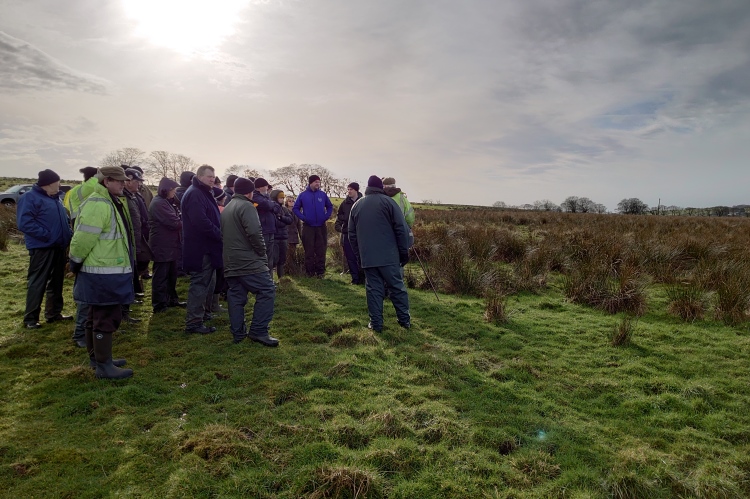Winning the battle against rushes – post event summary
3 March 2020Fighting rushes on upland farms can feel like a thankless task.
This meeting was a 3 year revisit to the Darvel farm we first visited in October 2017 (you can read about that meeting here). This time the event was designed to give farmers the necessary knowledge to reduce rush infestations on their farms. The meeting showed the results of the basic on-farm trial at Feoch farm. At the test site, various options for controlling rushes were showcased, from topping to spraying and weed wiping, 9 plots in total were set up to look at the cost of treatment as well as the long term effect of each option. Three years into the trial, there are some very exciting conclusions to draw.
The first part of a very wet day was spent in the comfort of a biomass heated shed, where attendees were shown 2 presentations on rush control and grazing management with a view to reducing rush infestations. This set a nice scene for the day. After lunch, we headed out to the trial site to see what had happened over the years. Attendees were encouraged to walk across the plots, with the event chair, Robert Ramsay (SAC Consulting) facilitating a discussion throughout. This open discussion with consultants, farmers, agronomists and students was highly valuable and very interesting.
Attendees were made aware at this was an on-farm demonstration rather than a repeatable scientific trial, so any conclusions were subject to error. However, it could easily be seen that some of the most common and most expensive methods of control were the least effective and the cheapest method, spraying with MCPA was the most effective on this site. Happily, there was a clear improvement across all sites, where lime had been applied, a very important take-home message for all at the meeting.
The meeting was buzzing with active discussion and feedback was very positive and all farmers were keen for this project to be extended into the future.
There is a selection of handouts available to download in the links below. If you have any other queries you’d like answered you can contact the FAS helpline either by phone on 0300 323 0161 or by email at advice@fas.scot
- Control of Rushes TN701
- Topics: Crofts & Small Farms and Crops and Soils
- Control of Rushes TN701 – Gaelic Smachd air luachair
- Topics: Crofts & Small Farms and Crops and Soils
- Technical Note (TN714): Liming Materials and Recommendations
- This technical note examines soil pH, choosing liming materials and lime recommendations for different soils.
- Practical Guide: Soil sampling I – How to take a soil sample
- This practical guide details what is required to take a soil sample for analysis that is representative of the area sampled.
- Topics: Climate Change, Soils and Water Management
- Practical Guide: Soil sampling II – Benefits to your business
- This practical guide details how soil sampling can benefit businesses by increasing productivity and create efficiencies on fertiliser inputs through better nutrient planning.
- Topics: Climate Change, Soils and Water Management
- Farming For A Better Climate: Practical Guide – Field Drainage
- Topics: Soils and Water Management
- Technical Note (TN720): Assessment for Agricultural Drainage Requirement
- This technical note examines drainage on agricultural land including the benefits, assessing for drainage, topography and possible issues.
- Technical Note (TN728): Planning Agricultural Field Drainage
- Agricultural drainage needs to be designed to suit the climate, ground conditions and crops to be grown. This technical note covers drainage taking into account areas, climate and topography.
Sign up to the FAS newsletter
Receive updates on news, events and publications from Scotland’s Farm Advisory Service

